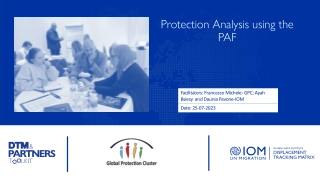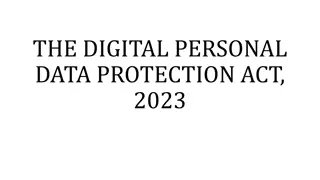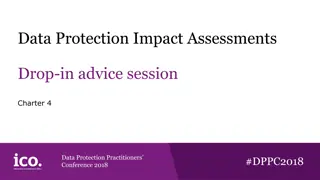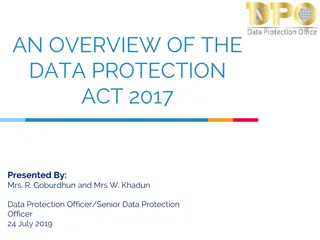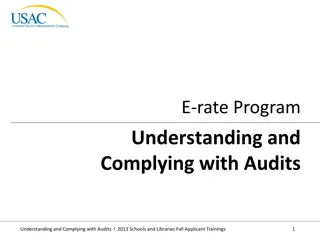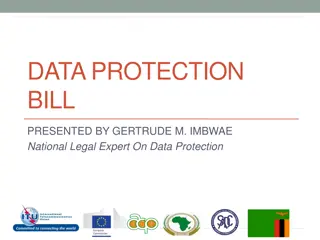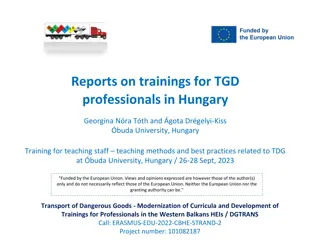
Training on Data Protection in EU Twinning Project
Explore key themes for training on data protection in the EU Twinning Project, including legal principles, rights of data subjects, transfers of personal data, and the roles of law enforcement authorities and institutions. Gain insights into the National Centre for Personal Data Protection and the Ministry of Justice and Courts, focusing on personal data processing and rights of data subjects.
Download Presentation

Please find below an Image/Link to download the presentation.
The content on the website is provided AS IS for your information and personal use only. It may not be sold, licensed, or shared on other websites without obtaining consent from the author. If you encounter any issues during the download, it is possible that the publisher has removed the file from their server.
You are allowed to download the files provided on this website for personal or commercial use, subject to the condition that they are used lawfully. All files are the property of their respective owners.
The content on the website is provided AS IS for your information and personal use only. It may not be sold, licensed, or shared on other websites without obtaining consent from the author.
E N D
Presentation Transcript
THEMES FOR TRAINING ON DATA PROTECTION EU Twinning Project Expert: Dana Voitina Project Activity: 2.1 Date: 8th June 2018
THE LAW ENFORCEMENT AUTHORITIES: 1. Personal data, principles relating to processing of personal data. 2. Legal basis of the personal data processing (especially data subject consent and controller legal obligation). 3. Rights of data subject (especially right to be inform and access to personal data). 4. Transfers of personal data to third countries or international organisations. 5. Competence of The National Centre of Personal Data Protection. 6. The law enforcement authorities data processing activities and internal procedures.
INSTITUTIONS WHO ARE CONTROLLERS OF INFORMATION SYSTEM Principles relating to processing of personal data (especially purpose limitation, data minimisation. Legal basis of the personal data processing (especially data subject consent). Rights of data subject (especially right to be inform and access to personal data). Competence of The National Centre of Personal Data Protection. Controllers personal data processing activities and organizational internal procedures. General information about transfers of personal data to another institutions or third countries or international organisations. 1. 2. 3. 4. 5. 6.
NATIONAL CENTRE FOR PERSONAL DATA PROTECTION Legal basis for data processing (especially data subject consent, controller legal obligation and the performance of a task carried out in the public interest). Principles relating to processing of personal data (especially purpose limitation, data minimization) and differences among them. Rights of data subject (especially right to be inform and access to personal data). NCPDP competence (duties, rights and responsibility). General information about transfers of personal data to another institutions or third countries or international organisations. Internal procedures of personal data processing. 1. 2. 3. 4. 5. 6.
MINISTRY OF JUSTICE, COURTS Personal data (sensitive personal data), principles relating to processing of personal data (especially purpose limitation, data minimisation, storage limitation). Legal basis of the personal data processing (especially data subject consent and controller legal obligation). Rights of data subject (especially right to be inform and access to personal data). Transfers of personal data to third countries or international organisations. Competence of The National Centre of Personal Data Protection. 1. 2. 3. 4. 5.
PARLIAMENT 1. Personal data (sensitive personal data), principles relating to processing of personal data. 2. Legal basis of the personal data processing. 3. Rights of data subject. 4. Competence of The National Centre of Personal Data Protection.
ASSOCIATION OF INDEPENDENT PRESS, CENTRE FOR INDEPENDENT JOURNALISM, PRESS COUNCIL, PROMO-LEX How to balance freedom of expression and personal data processing. 1. Principles relating to processing of personal data. 2. Rights of data subject (especially right to be inform and access to personal data). 3. Competence of The National Centre of Personal Data Protection. 4.

